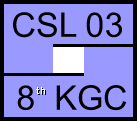|
|
Since the typical AI problem of making a plan of the actions to be performed by a robot so that it could get into a set of final situations, if it started with a certain initial situation, is generally exponential (it is even EXPTIME-complete in the case of games `Robot against Nature'), the AI planners are very sensitive to the number of variables, the inherent symmetry of the problem, and the nature of the logic formalisms being used.
The paper shows that linear logic provides a convenient tool for representing planning problems. In particular, the paper focuses on planning problems with an unbounded number of functionally identical objects. We show that for such problems linear logic is especially effective and leads to dramatic contraction of the search space (polynomial instead of exponential). The paper addresses the key issue: "How to automatically recognize functions similarity among objects and break the extreme combinatorial explosion caused by this symmetry", by means of replacing the unbounded number of specific names of objects with one generic name and contracting thereby the exponential search space over `real' objects to a small polynomial search space but over the `generic' one, with providing a more abstract formulation whose solutions are proved to be directly translatable into (optimal) polytime solutions to the original planning problem.
|
© 2002-2003 Kurt Gödel Society, Norbert Preining. |
2003-06-04


 | |

 Print this page
Print this page
